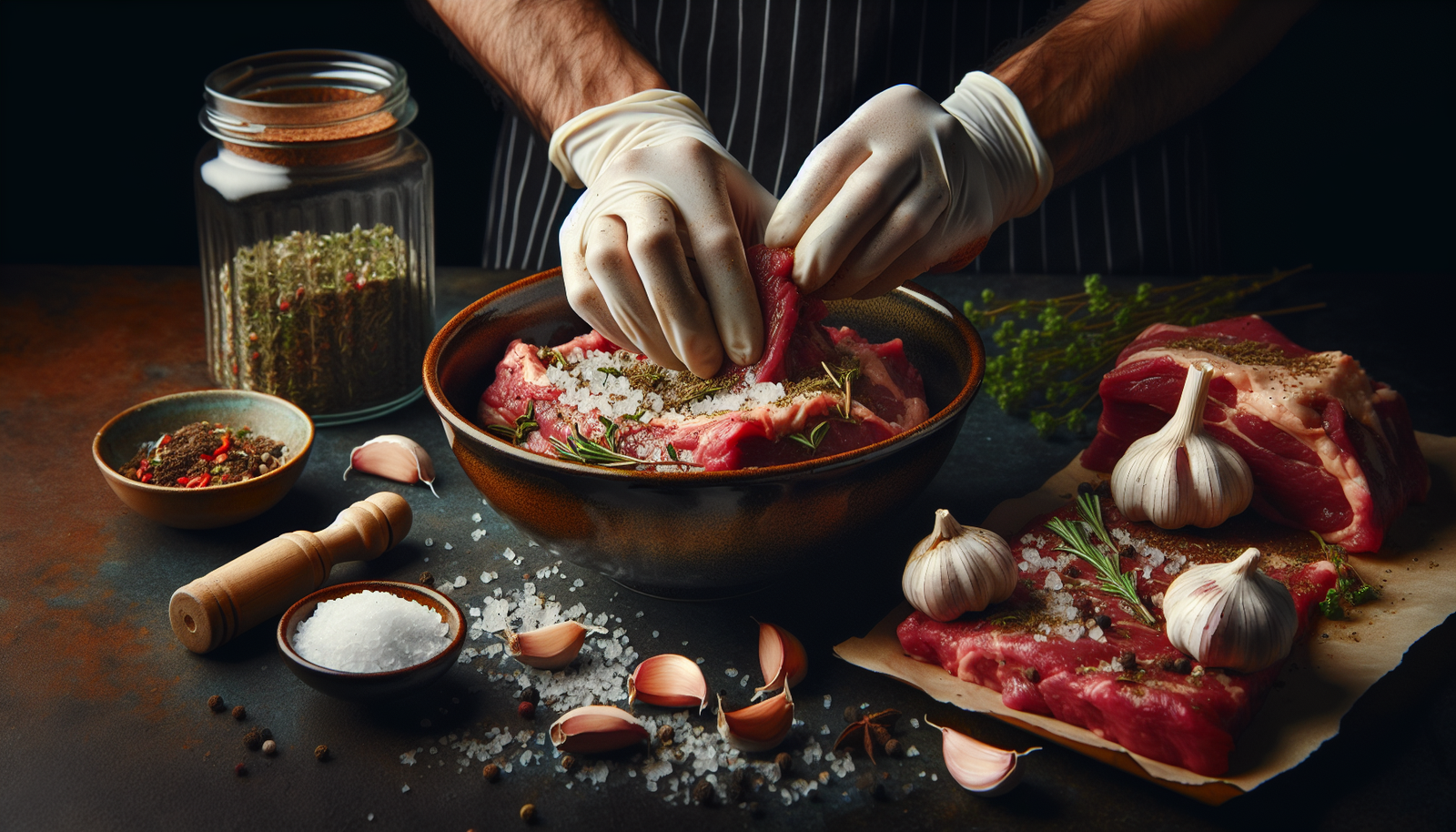
The Science Behind Salting and Marinating Meat
Salting and marinating meat involves a bit of science that can greatly affect the final flavor. This article explains how salting works and the best ways to marinate your meat to ensure tenderness and flavor are maximized every time you cook.
The Importance of Salting Meat
Salting meat is an essential practice in culinary arts, enhancing both taste and texture. Understanding how salt interacts with meat paves the way to a delicious dish. This section delves into the science behind salt’s influence on moisture and flavor, various dry brining techniques, and the optimal timing for salting.
How Salt Affects Moisture and Flavor
Salt is a transformative element in cooking. It draws moisture from the meat, creating a concentrated brine that reabsorbs, leading to a juicier final product. This process not only impacts moisture but also enhances flavor. Through osmosis, salt breaks down protein structures, allowing flavors to penetrate more deeply. A well-salted piece of meat boasts a robust flavor profile, making every bite memorable.
- Improves moisture retention
- Enhances natural flavors
- Breaks down proteins for tender meat
Dry Brining Techniques
Dry brining is a method where salt is applied directly to the meat’s surface. It requires patience but yields impressive results. Sprinkle a generous amount of salt evenly over the meat, then refrigerate it uncovered. This technique allows the salt to penetrate deeply without excess moisture. The result is a beautifully crusted exterior and a succulent interior.
Steps to Dry Brine
- Choose coarse salt for better control and distribution.
- Apply salt evenly, using about 1 tsp per pound of meat.
- Refrigerate the meat, uncovered, for several hours or overnight.
The Timing of Salting
Timing is crucial when salting meat. Too early, and the meat becomes too salty; too late, and it lacks flavor depth. Ideally, salt large cuts of meat at least 12-24 hours before cooking. Smaller cuts can be salted 30 minutes to an hour before cooking. Adjusting the timing based on the type of meat and desired outcome ensures the best results.
- Large cuts: 12-24 hours before cooking
- Smaller cuts: 30 minutes to 1 hour prior
- Seafood: Just before cooking to prevent excess water loss
Best Marinade Ingredients for Meat
Marinating meat transforms its texture and flavor, making it a staple technique for any cook. The right balance of acids, oils, and herbs can turn an ordinary dish into a culinary masterpiece. This section explores the perfect marinade ingredients, techniques for different types of meat, and ideal marinating times.
Balancing Acids, Oils, and Herbs
A successful marinade balances acids, oils, and herbs. Acids like vinegar or citrus juice break down meat fibers, tenderizing them. Oils coat the meat, locking in moisture and flavors from herbs and spices. Combining these elements creates a marinade that infuses the meat with vibrant flavors.
Key Ingredients to Include
- Acids: Vinegar, lemon juice, yogurt
- Oils: Olive oil, sesame oil
- Herbs and Spices: Garlic, rosemary, thyme
Marinating for Different Types of Meat
Different meats require different marinating approaches. While chicken benefits from a short marination, tougher cuts of beef require longer periods. Fish and seafood need a delicate touch, with shorter marination to prevent the acid from cooking the flesh prematurely.
- Chicken: 1-4 hours
- Beef: 6-24 hours
- Fish and Seafood: 15-30 minutes
Marinade Times for Maximum Flavor
Maximizing flavor through marination involves striking the perfect balance. Over-marinating can lead to mushy textures, while under-marinating might not impart enough flavor. Understanding the right time frames for different meats ensures optimal results, bringing out the best in every dish.
Suggested Marinade Durations
- Poultry: Up to 4 hours for whole birds, less for smaller pieces
- Red meat: Up to 24 hours for robust flavors
- Seafood: Less than 30 minutes to maintain texture
Science of Flavor Penetration
The science behind flavor penetration explains how marinades and salts transform meat. By breaking down meat fibers, these ingredients allow deeper flavor infusion. This section explains how marinades act on meat, the importance of rinsing or drying post-marination, and how to combine salt with marinades for enhanced flavor.
How Marinades Break Down Meat Fibers
Marinades work by altering the meat’s protein structure. Acids in the marinade denature proteins, making the meat more tender. This breakdown allows flavors to penetrate deeper, enhancing taste. The process varies depending on the marinade’s acidity, affecting the final texture and flavor of the meat.
- Acids denature proteins for tenderness
- Flavors penetrate deeply
- Varied textures based on acidity levels
When to Rinse or Pat Dry
Post-marination handling affects meat texture and flavor. Rinsing removes excess marinade but can dilute flavors. Patting dry preserves flavor while ensuring a good sear during cooking. Decide based on the dish: rinse when a milder flavor is needed; pat dry for robust, concentrated taste.
- Rinse for milder flavor
- Pat dry for concentrated taste
- Patting dry ensures better searing
Combining Salt and Marinades
Combining salt and marinades can elevate flavor profiles. Salt enhances marinade effectiveness by drawing out moisture, which reabsorbs with added flavors. This combination requires balance to avoid overpowering tastes. Applying salt before marination allows for even distribution and a well-rounded flavor.
Steps for Combining Salt and Marinades
- Salt the meat lightly before marination.
- Apply the marinade, ensuring an even coat.
- Allow enough time for flavors to meld.
Conclusion
Salting and marinating meat is a blend of science and flavor. Understanding how salt and marinades work on a molecular level helps you bring out the best in your meats. With the right techniques, you can ensure your meat is flavorful, tender, and delicious, making every meal memorable.
FAQ
Why is salt important when cooking meat?
Salt enhances the natural flavors of meat, making it more savory and delicious. It helps in retaining moisture during cooking, ensuring juicy results. Additionally, salt can break down muscle fibers, slightly tenderizing the meat for better texture.
How long should I marinate meat?
Marinating times vary based on the type of meat and the marinade used. Chicken and fish generally need 30 minutes to 2 hours, while beef and lamb can benefit from marinating for 2 to 8 hours. Overnight marinating is ideal for tougher cuts. Always refrigerate while marinating.
Can I over-salt meat?
Yes, using too much salt can overpower the natural flavors and make the meat too salty. It’s important to measure carefully and adjust according to personal taste. If over-salted, try to balance it by adding a little sugar or acidic ingredients like lemon juice.
Does salting meat make it tender?
Salting meat can make it tender by breaking down proteins and muscle fibers. This process helps the meat retain moisture, resulting in a juicy texture. Allow the salt to penetrate by letting it rest on the meat for at least 30 minutes before cooking.
How do marinades work?
Marinades infuse meat with flavor through acidic ingredients, oils, and herbs. The acids, like vinegar or lemon juice, help tenderize the meat by breaking down proteins. Oils hold flavors and keep the meat moist, while herbs and spices add aroma and taste.
Should I rinse meat after salting or marinating?
Rinsing meat after salting or marinating isn’t necessary and can wash away flavors. Instead, pat the meat dry with paper towels to remove excess moisture. This ensures better browning during cooking.
“`











